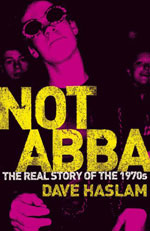Recent Reading December 2005

How wrong I was [again]. The book kicks off with a conversation between Ingrid Sischy [no idea so donít ask] and Camille Paglia [yes you should know; look her up], gathers pace with an intriguing heavyweight discussion of Postmodern Minstrelsy studies [!], and rolls on into a wide-ranging array of stuff, including Sasha Freer-Jones on postpunk in 1979 and a delightfully paranoid exposition of shortwave radio signals. The American take on things is interesting and sometimes annoying, especially when it comes to Nirvana and punk, or taking AOR a little bit seriously, but pieces like The Onionís skit on a country ballad halting the trucking industry is spot on.
So full marks to the young T.J. Leroy, and letís look forward to the next installment, with ≠ as ever ≠ a plea for a little more digging and searching among the internet zines and indie journals, not just the mainstream and established alternative press.
Dave Haslam has been high profile since his days DJ-ing at The Hacienda, although I seem to remember in the early 80s he ran a fanzine I used to buy when visiting Manchester (that would be Debris - ed). In Not Abba he sets out to tell The Real Story of the 1970s, and does a pretty good job of it. If it seems a little Northern-centric, thatís because thatís what he knows; itís good to have some discussion of the strikes, political violence and alternatives that happened way back then. Itís this contextualisation that sets the book apart, I guess ≠ I mean thereís been a whole spate recently of post-punk discussion and alternative versions of the music, but putting the fashion and music back into the real world of politics and society is an interesting process for the reader [this one, anyway].

But I would like to point out that Autobahn wasnít Kraftwerkís first album, and that the Nashville didnít have steps to fall down ≠ it was a pub venue at street level. Whenever I notice things like this, I wonder what else has gone unchecked. I also dislike the fact that Haslam re-cycles paragraphs, snippets of information, a couple of times over, sometime to reintroduce a topic, sometimes to remind the reader whatís already been said ≠ either way itís bloody annoying.
The recent Re:Search volume, J.G. Ballard: Conversations ≠ a follow up to their Quotes volume, also has some repetitions in, but itís ok in the context of a wide-ranging set of interviews from the last 30 years. Even when asked the same questions Ballard is engaging, witty and perceptive, proffering comment and analysis on wide-ranging topics, from science to science fiction, psychology and sociology to madness and mindlessness. The bookís psychedelic front cover sits uneasily with the much cooler design inside ≠ strange black & white photos, generous clear text ≠ but itís a real insight into both Ballard and the world we live in.
© 2005 Rupert Loydell